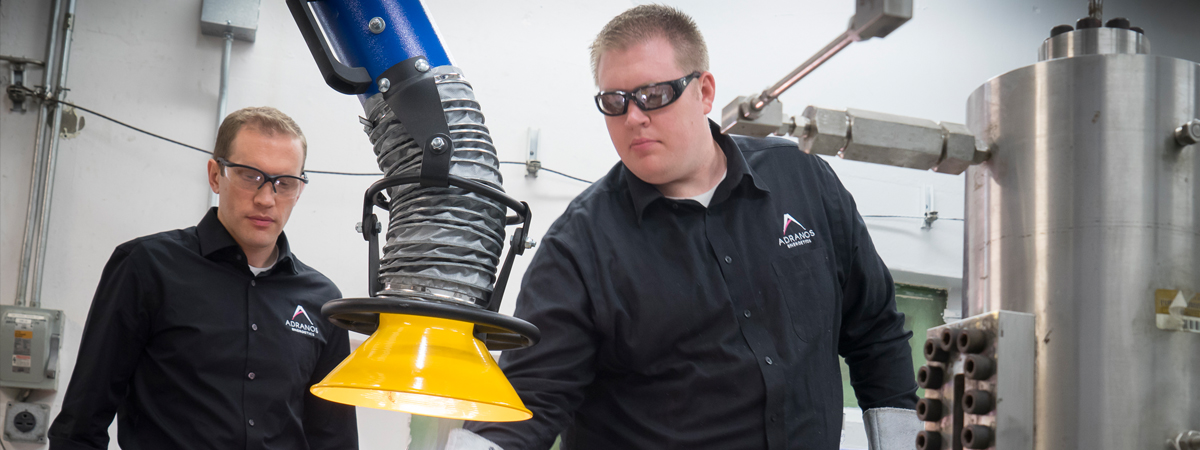Boilermaker pioneers clean, energy-efficient rocket fuel
Boilermaker pioneers clean, energy-efficient rocket fuel
| Author: | Bill Meiners |
|---|---|
| Magazine Section: | Always |
| College or School: | CoE |
| Article Type: | Issue Feature |
| Page CSS: | #article-banner { background-position: center top !important;} |
| Feature Intro: | Lithium-based solid fuel may change the propulsion industry. |
While earning his master's and PhD in aeronautics and astronautics at Purdue, postdoctoral researcher Brandon Terry made a breakthrough discovery: he developed a way to create an environmentally clean, high-performing, solid rocket fuel. With academic grounding in three engineering disciplines — chemical engineering and mechanical engineering, as well as aeronautics and astronautics — Terry found a secret ingredient in lithium.
Terry’s mentors included internationally recognized experts Steven Son, a professor of mechanical engineering with a courtesy appointment in aeronautics and astronautics, and I. Emre Gunduz, a research assistant professor of mechanical engineering.
In 2016, Terry and business partner Chris Stoker, an Indiana University alumnus, founded Adranos Energetics LLC to develop the technology.
The backstory
About a year before completing his PhD, Terry found himself running through thousands of computer simulations to verify a surprising lab discovery — which he first thought to be a mistake. Terry’s thermochemical calculations showed that propellant with aluminum-lithium in place of the usual aluminum fuel could dramatically reduce the hydrochloric acid (HC1) produced (because lithium chloride salt is formed instead of HCl) as well as predict a higher specific impulse.
“Current rocket fuel sources emit toxic hydrochloric acid that damages the environment and corrodes launch equipment, resulting in expensive environmental remediation and equipment maintenance costs,” Terry says. “Our fuel combustion process prevents hydrochloric acid from ever forming, eliminating the rocket’s negative effects.”
He shared his findings with his mentor, Professor Son, who asked, “Why has nobody done this?”
As Stoker helps convey the message and raise capital, Terry offers enthusiastic analogies to explain his research process. “It’s a lot like baking a cake,” he says. “Solid propellants are basically three ingredients — two dry powders and a liquid to mix it all together.” Typical ingredients for rocket fuel are ammonium perchlorate, a solid oxidizer, and powdered aluminum for the fuel, Terry explains. Metal is used because it burns hotter than carbon, providing better performance. In fact, aluminum has been the additive of choice since the beginning of the space program.
Son says there is good evidence for potential success. “If proven fully in rocket motors, this will be a significant milestone in the development of solid fuel rocket motors and will save millions of dollars in launch site corrosion while improving payload and range.” Furthermore, as a safety benefit, the new propellant could mitigate the violence of a slow cook-off situation, which could cause something to auto-ignite.
Adranos Energetics is based in Indiana, where Stoker holds down the fort. Meanwhile Terry, who recently partnered with Utah-based AeroTech Consumer Aerospace, a division of RCS Rocket Motor Components Inc., is scaling up the technology in the region’s nearly steady 30 percent humidity — a perfect climate for mixing propellants.
The company has won numerous national competitions for startups, including the prestigious Burton D. Morgan Business Plan Competition. In January 2017, the company won funding from the Elevate Purdue Foundry Fund. With $150,000 in current funding from the Department of Defense and an application submitted for an additional $5 million, Adranos Energetics is on a roll.

Comments